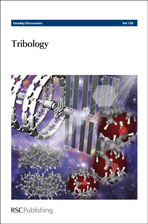Cell friction
Abstract
Cells sense and respond to their environment. Mechanotransduction is the process by which mechanical forces, stress, and strains are converted into biochemical signals that control cell behavior. In recent decades it has been shown that appropriate mechanical signals are essential to tissue health, but the role of friction and direct contact shearing across cell surfaces has been essentially unexplored. This, despite the obvious existence of numerous biological tissues whose express function depends on sliding contacts. In our studies on frictional interactions of corneal cells we find that the friction coefficients are on the order of μ = 0.03–0.06 for in vitro and in vivo experiments. Additionally, we observe cell death after single cycles of sliding at contact pressures estimated to be ∼12 kPa. These experimental results suggest that frictional contact forces produce mechanical stresses and strains that are in the cellular mechanosensing ranges.
- This article is part of the themed collection: Tribology

 Please wait while we load your content...
Please wait while we load your content...